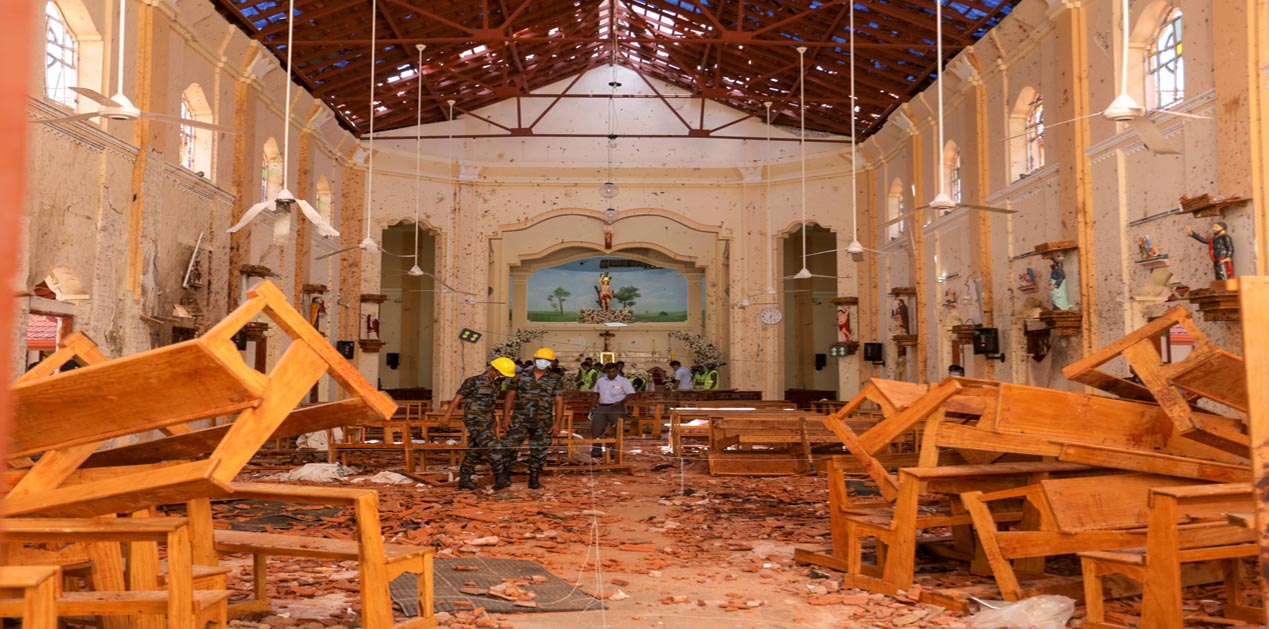The Easter Sunday Church Bombings (April 21, 2019) in Colombo and other parts of Sri Lanka has altered the internal security situation and the political arithmetic in that country. The Islamic State of Iraq & Syria (ISIS) claimed ownership of the attack as also that it marked a shift in its tactics. It was the deadliest attack on civilian targets in Sri Lanka in the past decade and was aimed primarily at the minority Christian community and its icons. The signaling was that the community was no longer collateral any more but were the main targets in the new format of the global jihadi campaign of the ISIS.
Simultaneously, the bombing incident sent harsh warning signals to India and countries in its neighborhood, and especially the ASEAN, about the present and clear dangers of lowering guard against the ISIS. More importantly, there is a message on the need to create a broader regional coalition including exchange of intelligence, experience and expertise to detect, deter and destroy violence in any form or shape. Naturally, this transnational cooperation has to be done discretely and way from public gaze to avoid political backlash and attacks in civil society and social media.
There are twin factors that require urgent attention of the national stakeholders of Sri Lanka. Firstly, there is the hard realism for Sri Lanka to put its house in order as soon as possible and create conditions for early return to normalcy. Further, it must be prepared to meet the threats posed by inimical elements and prepare for challenges that lie ahead in 2019 with a packed political calendar. Secondly, the Sri Lankan economy is a shadow of its former self; it has suffered a second major blow in five months since the abortive constitutional ‘coup’ of October 2018, which had left the country paralyzed for several weeks resulting in loss of billions of dollars of revenue, investor confidence and reduced tourist traffic. Sri Lanka, therefore, is in for a long haul towards economic recovery. It would require huge international assistance in this direction.
The weight of the twin factors depends on the role of the main political actors in the country. It is important that all stakeholders within the government and outside of it close ranks immediately and create synergies to restore confidence among the citizens without fear or favor. There is no alternative to it.
The conflict between President Maithripala Sirisena and Prime Minister Ranil Wickremesinghe is the main reason for the breakdown in national security arrangements and the consequent paralysis in decision making. There are precedents to such situations. In February 2004, then President Chandrika Bandarnaike Kumaratunga, without any ostensible reasons, dismissed the United National Front (UNF) coalition government headed by Ranil Wickremesinghe and ordered parliamentary elections, which he lost in April 2004. It will be recalled that at that time, Ranil Wickremesinghe had emerged a stronger politician following the cease-fire with the Liberation Tigers of Tamil Eelam (LTTE). The rest is history.
PM Ranil Wickremesinghe has publicly admitted to the lack of personal chemistry between him and President Maithripala Sirisena and that it had intensified since October 2018. He has also made public claims that he was not kept in the loop on matters of national security. He found his hands tied when the Easter Church bombing took place. It is learnt that President Sirisena was in Singapore after completing a pilgrimage to Tirupati. For reasons best known to him, he did not deem it fit to nominate an acting Defense Minister. In contrast, when the Tsunami broke in December 2004, the then Prime Minister Mahinda Rajpaksa took charge of the situation, when President Bandarnaike was in London, and she had not appointed a minister in her stead to look after defense and security matters. Rajpaksa had seized the opportunity to quickly put into place arrangements for recue and relief operations and supervised efforts till Bandarnaike returned to take charge of all activities.
Several Colombo based senior political analysts have admitted that India has played a pivotal role in sharing real time intelligence with Sri Lanka. This was also admitted by the government leaders. That the country had received intelligence reports from India and perhaps other friendly agencies is one thing but failure to act effectively thereon needs to be probed thoroughly. It is inescapable that both the President and the PM would not have been oblivious to the developments in the society, especially the spread of inter-communal fissures and hatred in the country. For this, they did not have to rely exclusively on their agencies, they had their political antennae capable of keeping an eye on ground developments and updating the leadership accordingly. Further, it is also not understood why the relevant agencies had taken their eyes of the radar especially on the activities of ISIS in the ASEAN region, in the neighbouring South Indian states and the Philippines in particular. Both, the President and the PM would need to share the blame and be accountable to the people and the Parliament.
The inquiry committee headed by a senior Justice, constituted by the President, is expected to look into all aspects of the Easter Church bombings and to come up with recommendations. This Committee has the onerous task to pin-point reasons for failure to act on credible real-time intelligence given by a friendly foreign agency. It must look at gaps existing in the security and intelligence apparatus and finally recommend steps to insulate it from its present ills. There is a need for this committee to look into constitutional arrangements and suggest a way forward avoiding pitfalls leading to failures in national security management, particularly in crisis situations.
The upsurge in the activities of radical elements in the Eastern province is a matter of great concern and it requires special attention. In a manner of speaking the situation in the Jaffna Peninsula is different and peaceful than in the sensitive East. The involvement of affluent Muslim families also needs a clear understanding. In some ways, it resembles the Dhaka Café bombing two years ago. The similarities are too obvious to escape notice. It also establishes the fact that the ISIS is using local outfits to carry out such attacks for tactical reasons. Sri Lankan agencies could do well to liaise with their Bangladeshi counterpart as also with India in this connection. India, Sri Lanka and Bangladesh are no longer pebbles in the stream but are now in the same vector on international terror.
It is remarkable that the law and order situation in Sri Lanka has remained peaceful despite the deadliest attacks due to many pro-active measures of the authorities. The role of the top leadership of the religious groups has been praiseworthy and it has gone a long way in bringing calm and composure to a highly emotive community. This must become a permanent feature given the troubled relationship between different sections of the community. The government has initiated several measures including changes in the police, intelligence and security set-up and obviously more is expected in the troubled Eastern province. The Presidential elections in Sri Lanka later in the year will set the compass for future movement of its national security policy.
The Sri Lanka police has an excellent record for its performance during the anti-LTTE operations and its Special Task Force has very few equals in the world. The military is the last resort and no one doubts its record either. It is now for the political class and civil society to play a pro-active role to build on the platform provided by the religious leaders and by the security forces.
There is skepticism in the bulk of Sri Lankan society on India’s role in providing hard intelligence ahead of the Easter bombings. Several Colombo based-political analysts attribute trust deficit in the Sri Lankan security establishment towards Indian agencies based on past experiences. The public rejection of India’s offer to send its anti-terrorist force, National Security Guard (NSG), to help its Sri Lankan counterpart is one such example, as per the statement of former President Mahinda Rajpaksa. There are two issues here that need to be addressed. Firstly, Sri Lanka requires India’s help, experience and expertise in dealing with trans-national threats of this nature. Sri Lanka is not fully prepared either politically or otherwise to tackle such challenges. Further, India too requires Sri Lanka’s collaboration to help secure its hinterland from inimical elements seeking to create problems in southern India. Secondly, Sri Lankan political establishment would need to separate politics from national security and also ensure that in such matters, evolving a bipartisan approach is important.
Each time there is a crisis in Sri Lanka, India is the first responder and there is no let-up in this approach. This must receive due acknowledgement and recognition. India has a significant role to play in this direction not only in its immediate neighborhood but also in larger the ASEAN region.
Image Source: https://fortunedotcom.files.wordpress.com/2019/04/sri-lanka-bombings-e1555939430806.jpg










Post new comment